
YOUTH BASEBALL
THE AUTHOR OF THIS PAGE
played baseball at Guilderland Central High School in upstate New York, from 1968-1971.
In 1983 I was asked to coach a Babe Ruth Baseball team in Guilderland (Photo at right. I am far right in the back row). All of 29 years old, most of the parents were in their 40's, the players 14-15. Hodari Brooks back row center was 6'2" tall! This I did until 1985. It started a long passion that I continued when I moved to Arizona in 1999. I finally hung it up in 2012 at age 59. Along the way, I learned a lot, not only about coaching but many other things as well. Some I will present here. Others in more detail I put in two published books.

BASEBALL I explain to many people is, in addition to being the “American Pastime,” rather unique in the realm of team sports. Football, hockey, basketball, lacrosse, soccer and the like involve almost continuous activity on the part of the players and are played to a regulation time limit. The object of scoring in all of these is to move and place an object, whether it is a puck or some form of a ball into a net, across a goal line, or through the uprights. The rules are relatively straightforward, except in the case of some penalties. Teamwork is essential of course.
Other “team” sports like wrestling, swimming, track & field and similar venues are basically individual contests whose results are tallied for a team result.
Baseball on the other hand, has no time limit and theoretically could involve infinite innings and time. The rules are monumentally complex. For example, the rules covering a balk in the rule book almost equal all the other rules combined. Many like the “infield fly” and being called out by a fouled off bunt when there are two strikes on the batter were added from experience to foil exploitation of the original rules.
The ball is also secondary to the person. Although used in play, scoring is based on how often a human being rounds the bases and gets safely to home. It also requires teamwork but of a different sort. Two of the players on a team are heavily involved in every play handling the ball - The pitcher and the catcher. Periodically, other players will handle the ball either to catch or throw it accurately - some positions more often than others, for example: the first baseman.
However, all nine players are involved in each play even if they don’t actively handle the baseball. Physically and mentally. If the ball isn’t hit at the player, the player must know where to go and what to prepare for, either backing up a fielder handling the ball, a throw from another player, or covering a base. And they have to know in advance of every pitch what to do in any and all possible various situations. Players spend often more time warming up and preparing mentally than they actually spend handling the ball in an active situation.
There are games in which a player never handles an active ball but still must prepare with every pitch. With two outs in the last inning the player who has not caught or thrown a ball for hours must be ready to do so right up to the end, often with the result of the game in the balance! One time for example, in my senior year of high school I was in right field for the entire game and not one ball was hit in my direction until with two outs in the last inning with the other team’s winning runs on base, I had to catch a sinking line drive in my direction. Fortunately, I made the catch and was heartily congratulated. If I hadn’t - well - you get the idea.
Penalties exist, but they rarely are called and very seldom affect the outcome. Poor behavior is penalized by ejection from the game but another player takes the offenders place. Imagine if baseball was like hockey? A couple players get ejected for arguing or poor conduct and suddenly there are only six or seven players on the field! Possibly like football? A penalty moves back the pitchers mound fifteen feet?
Baseball also involves five very different skill sets that ALL players must gain to do well. The “five tools” as they are called:
1. Throwing the baseball hard and accurate.
2. Catching the ball high in the air or on the ground.
3. Running fast and sometimes sliding into a base.
4. Hitting a round ball thrown toward you often at high velocity or curving, sliding or waffling (knuckle balls) with a round bat.
5. Maintaining the mental attitude of hard work, practice, perseverance, teamwork, and sportsmanship.
These skills take time and in my humble opinion is why soccer as a game is so very popular with younger kids. This is not to denigrate the massive skill sets an advanced soccer player has, but basically all a very young kid needs to learn is how to run and kick a fairly large round ball. And they get to run around a lot so they are not “bored.”
Also in my opinion, baseball is also ideal for learning life skills. Failure is as much a part of the game as success. A batter that hits the ball safely only 40% of the time is a huge success. Major league teams that win 60% of their games are hugely successful and almost always wind up in the playoffs.
Other social skills are a large part of the game too. Learning to deal well with authority (the umpires and coaches), spectators, teammates and opponents are in my opinion, skills that last long past playing days, whether those going no further than Little League or a long career in the Major Leagues.
“Baseball,” paraphrased as spoken by James Earl Jones in the film Field of Dreams, “is what marks our time.” In many cases, it marks our lives even if the foul lines are not always clear.
To contact the author click below
To return to page one
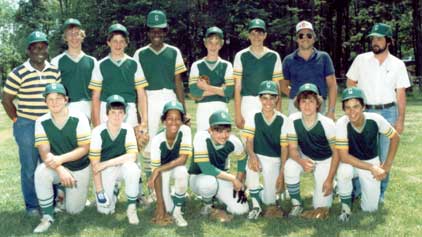
Guilderland Babe Ruth baseball 1983
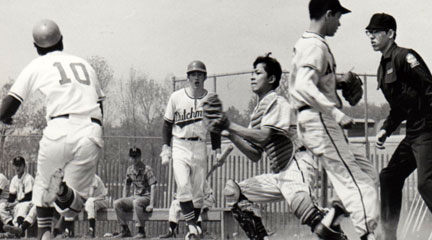
The author as a player in 1969. I was the on deck hitter and as coached to do, I picked up the batter's dropped bat for safety and prepared to coach home plate.
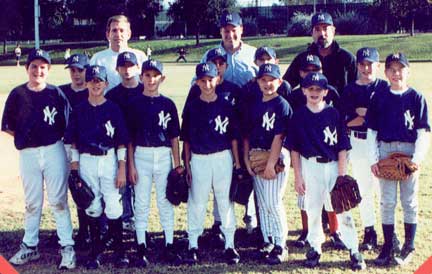
The first Arizona Pony/Babe Ruth team in 2000 - ages 9-12
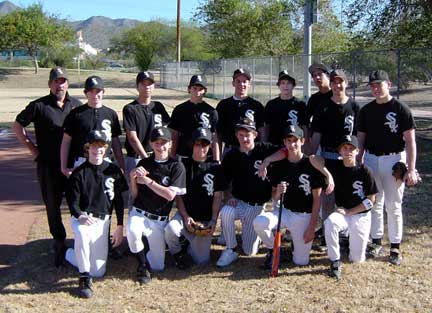
The Black Sox in 2005 - ages 14-15
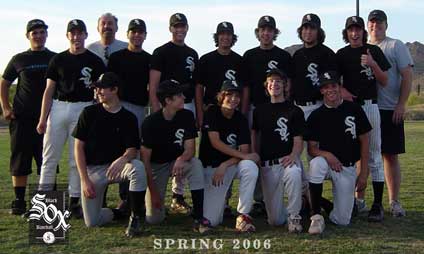
Black Sox 2006 - ages 16-18. Many of these young men did not make their high scool teams but still loved to play ball. I recieved a call one day from the player in the back row, far right. He explained to me that he had put together a team but they needed an 'adult' to coach and administer the team in the league. Having known him for many years, I replied, "Build it and I will come." Everyone had a blast. It was one of many older groups I 'coached.'
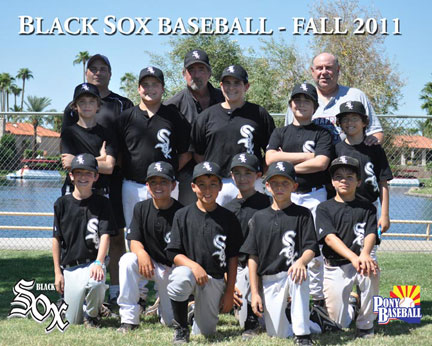
One of the last teams age 11-12.
------------------------------------------------------
LESSONS LEARNED
Vince Lombardy was WRONG! His memorable axiom that “winning is not the most important thing, it’s the ONLY thing” has poisoned the realm of sports ever since.
What ever happened to: “It doesn't matter whether you win or lose, it’s how you play the game?” Play hard, play fair, try your best to win but be gracious in either victory or defeat. This used to be called sportsmanship. The concept of teamwork, respect for the game, the officials, your teammates, spectators and your opponents seems all too often to be over shadowed by the Lombardy notion that winning is all that matters. I have seen this false notion all too often in youth sports.
Kids being verbally abused, or humiliated by players, coaches and parents because they failed or made a mistake is not what youth sports should be about. Many kids dream of big league careers but of course, this is a one in ten thousand chance at best. Parents also have big dreams of sports scholarships or living vicariously through their children's accomplishments. These notions are the antithesis of the love of the game, honest competition, growing skills, and perhaps learning life lessons that will endure long after the time for sports is over. And they are just plain wrong.
I coached youth baseball ages 10-18 over nearly 30 years and 45 seasons and strove mightily to avoid the “Lombardy syndrome.” As both a player in high school and as an adult coach I was as competitive as I could be and we always tried our best to win, but it was never the most important thing.
Oft time I would begin the first practice by telling the kids I was thinking of a number between 1 and 10,000 and asked them to try to guess the number. Of course, they couldn’t, and I went on to tell them that those were the odds of becoming a pro baseball player, “so let’s learn the skills of the game, have fun and go as far as possible.”
For example: I heartily congratulated an 11-12 year old team of mine after losing a game 0-1. The game was finished in record time because neither side made one fielding error, which is virtually unheard of at that level. There were very few walks or strikeouts also. I asked the umpire Brian how many times he had seen that cleanly played a game and his response was, “Never.” And he had been an umpire for well over a decade and a half.
Many of my players went on to play high school and college baseball and many more went on to successful careers. Many condescend to be my friend on Face Book and this makes me deliriously happy. If my method contributed just a little to them leading happy, enjoyable and fruitful lives, I am a very happy camper.
One of the best compliments I ever received as a coach was from an umpire. We were in a tournament situation on two adjacent fields. The winner of game one would stay one the field and the loser would move to the adjacent field. The winner from that game would likewise move to the other field. After the first game, the umpire, (Brian again) whom I knew very well from our years in the league, did not know what the arrangement was regarding switching fields, so he asked if my team was moving or staying on his field for the next game. When I told him we were staying he said, “Good, glad to hear it.” He knew my boys respected the officials, the game and themselves. He told me he always enjoyed umpiring games we were playing in.
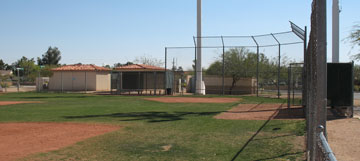
One of the many fields we played on in Arizona,
this was adjacent and owned by a large Lutheran
church. When I asked the league director
why a church had a baseball field, I was told
that the founders wanted the
field for their children.
To fund it all of the
stadium lights have cell towers on them!
Such a creative way and
good stewardship.
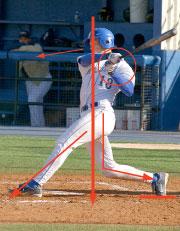
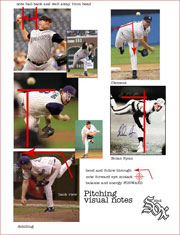
As a graphic designer, I often created visuals to
illustrate fundamental skills.
***
See these at www.jgreenbooks.com
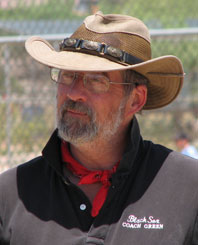
2008
EVEN NOW in 2019, I am fortunate to still be in contact with many of the parents and players.
